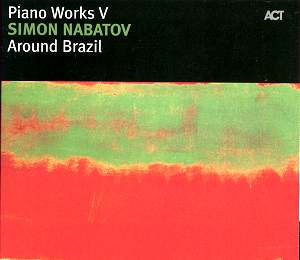1. Desde Que o Samba e Samba
2. Estrada do Sol
3. Partita de Marco
4. Nene
5. Eu Vim da Bahia
6. Depois Que o Ile Passar
7. Na Baxia do Sapateiro
8. My Sertao
9. Valsa de Porto Das Caixas
10. Qualquer Coisa
11.
Voce e Linda
Simon Nabatov – Piano
Russian-born
pianist Simon Nabatov is a chameleon. When
I first heard him, he was playing Benny Goodman-style
jazz on the 1996 album Swing Kings
with vibist Wolfgang Schluter and drummer
Charly Antolini. Even in this conventional
setting, one could tell that Nabatov was special
– not only capabale of playing classy Teddy
Wilson-type piano but also displaying the
most astonishing technique: creating phenomenal
runs that would have made Art Tatum proud,
while also treating the piano as a playground
for mischievously anarchic fun.
Other
Nabatov albums have emphasised his anarchy,
with adventurous experiments which often explored
the farthest boundaries of the avant-garde.
Both (or all) sides of his nature are present
on this album, which lets Nabatov loose in
a repertoire of Brazilian tunes, including
a couple by Antonio Carlos Jobim and three
by Caetano Veloso. Simon suggests Brazilian
rhythms rather than emphasizing them – and
without any need for help from percussionists.
Indeed, a percussionist would find it hard
to keep up with the fecundity of his imagination.
On Estrada do Sol, for example,
his hands seem to play two entirely different
rhythms at once. His own composition, My
Sertao, sounds like a classical toccata
with an underlying Latin pulse. Other tracks,
like Gilberto Gil’s Eu Vim da Bahia,
display a gentler, more lyrical side to Nabatov.
My
favourite track of all is Partita de Marco,
a ten-minute tour de force which starts
as if it was written by Stockhausen – jumping
about all over the piano, like an avant-garde
kitten on the keys. Musical lines come at
the listener from all directions before the
improvisation settles down into Jobim’s beautiful
Waters of March, decorated with gorgeous
rivulets of sound flowing from the keyboard.
Simon Nabatov seems capable of playing anything
– but then he was trained at the Moscow
Conservatory and the Julliard school.
The
sound is translucent – recorded at the Rainbow
Studio in Oslo last September. If you care
about good jazz – or good music of any kind
– you need to buy this CD.
Tony Augarde
